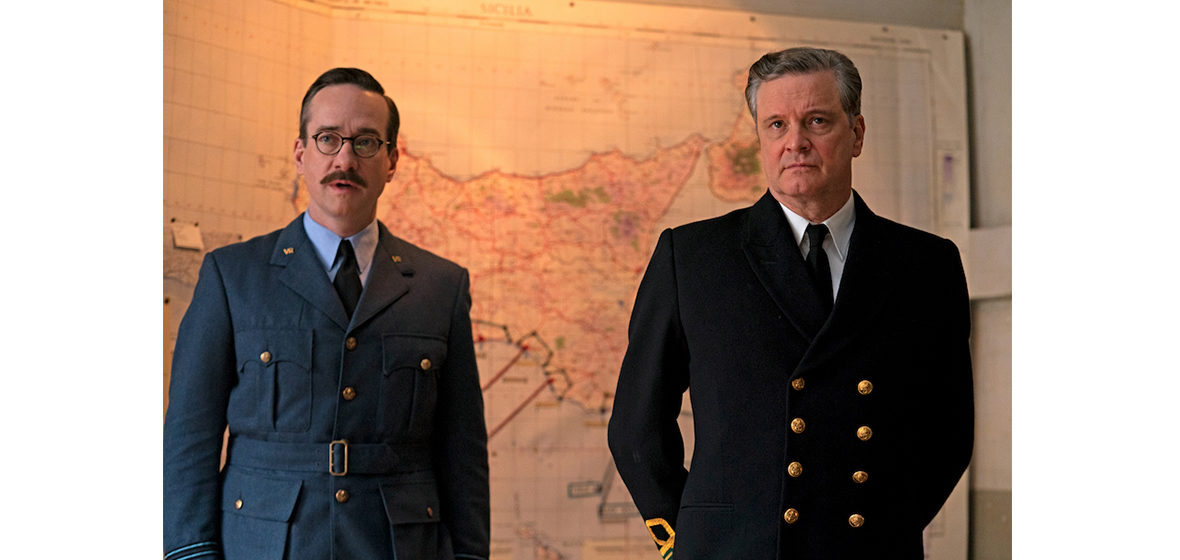Rating: ***
If you don’t know the deep cuts of World War II history, then Operation Mincemeat won’t mean much to you. It’s an odd title, almost out of place, and doesn’t relate to any genre or style. It feels offbeat even before you start watching it. But rest assured, there’s a history nerd somewhere where the mere passing reference of this title is enough pique their interest. Operation Mincemeat is a film for them – much like its esoteric title. It appeals first and foremost to those in the know and the rest of the film doesn’t make it easier for everyone else.
The story is improbably compelling. In 1943, the Allies prepared an invasion of Sicily, heavily guarded by German and Italian forces. The plan devised by Ewen Montagu (Colin Firth) proposed planting a dead body with a cryptic note hinting at an invasion through Greece, to be found by Spanish authorities so the intelligence could seemingly reach German spies. If it worked, the Germans would move troops out of Italy and open a path for an invasion by sea. But for it to work, many serious people would have to be fooled by a corpse washing ashore.
The British were reluctant to follow through with the plan if it wasn’t for Churchill’s belief. Whether he knew this was going to work or not, it is something the film doesn’t touch. Churchill was known to be enigmatic and careless in his tactical decisions, so his intentions were left open. In hindsight, we can applaud his calculated foresight, but we can also see why his other generals, like John Godfrey (Jason Isaacs), weren’t as keen.
Still, Montagu is given the green light and recruits a young go-getter Charles Cholmondeley (Matthew Macfadyen) and a diligent Jean Leslie (Kelly Macdonald), who will form a somewhat contrived love triangle that adds little depth to any of the characters.
Montagu sends his wife and child to America and gets relatively close to Leslie, who is dating a young American G.I. while catching the eye of Cholmondeley, who still lives with his mother and is trying to return the remains of his late brother killed in action in India. None of that is as interesting as a dead man on a beach with planted intel.
If there is heart and soul in this film, it’s the procedural nature of the plan coming to terms. In those moments, John Madden, the Director, shines through with giddy reverence for the whole operation. There is nothing distractingly cinematic about it. It’s practical and straight to the point, entirely relying on the fact the plot is so captivating it doesn’t need any visual bravado. Is it wrong? Another filmmaker could have elevated it someplace breathtaking, but I found myself appreciating Madden’s brevity. There’s a terrific scene where Leslie encounters a German spy that references other famous covert operations (including the infamous Valkyrie). We see a World War II film that appreciates how large and tangled the web of stories during the conflict was.
Madden is the kind of director a producer can rely on. From Shakespeare in love to The Best Exotic Marigold Hotel, he is efficient and unpretentious. From the moment the Spanish find the body, the whole sequence is a step-by-step practical affair of historical re-enactments by terrific actors. Firth, Macfadyen and MacDonald are all performing roles they can do with their eyes closed. A film like this allows them to hit the greatest notes of their careers without risk or taking too much away from the audience.
It’s hard to accuse Operation Mincemeat of anything but reliability. It knows who will want to watch the film and gives it to them exactly as they expected. It’s reliably unpretentious filmmaking at its best and made to please a hungry fanbase. A pre-Bond Ian Fleming is in the background (played by Johnny Flynn); he was involved in the operation as a young man and may have been the memo’s author that inspired the plan. In a bit of a wink at the end, he references this has inspired him to write a spy novel. Operation Mincemeat exists before the thrill of pulp spy had been invented.
Could it have been better? Sure, probably. But it would’ve lost the reverence to its subject. And we can all respect that.




